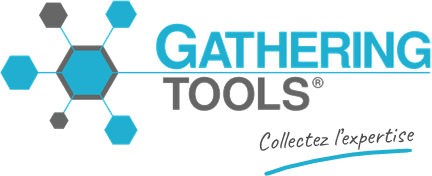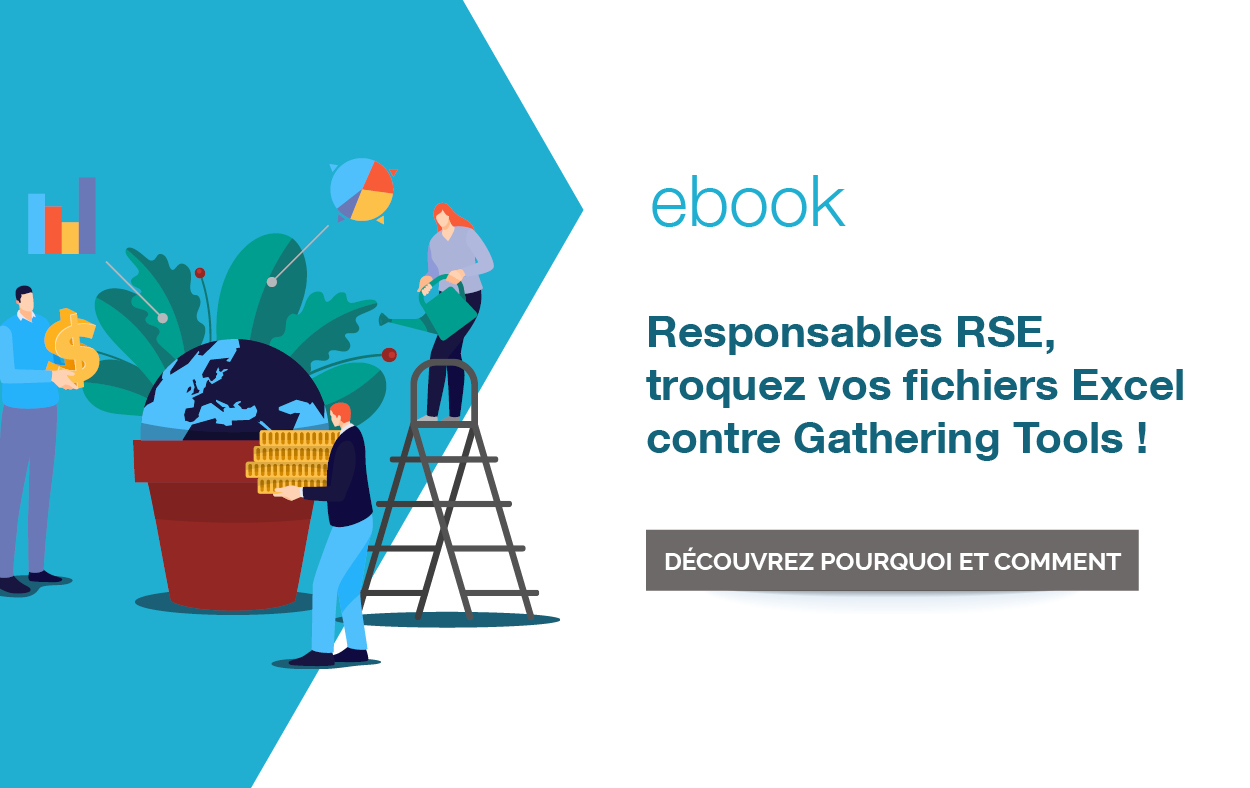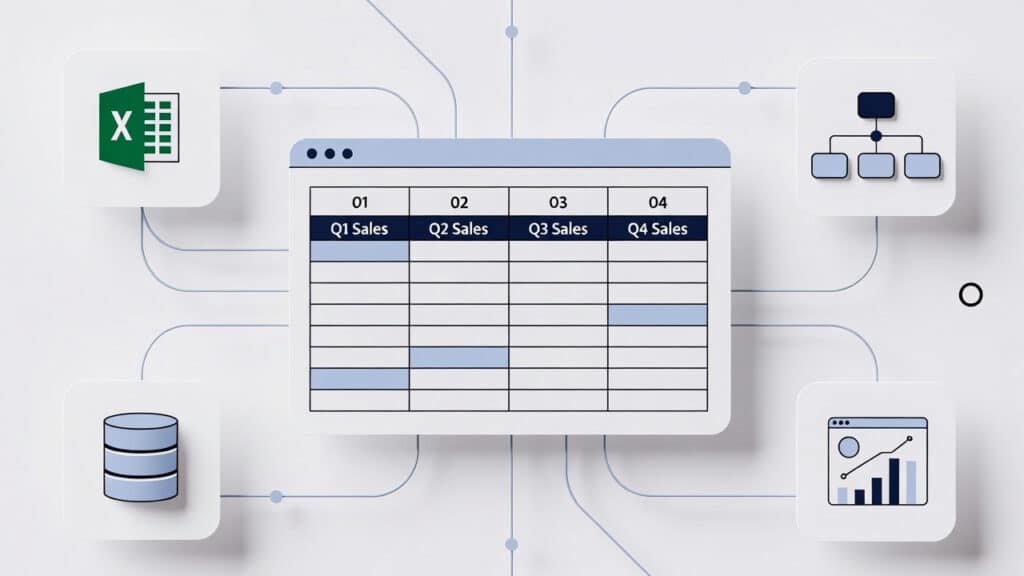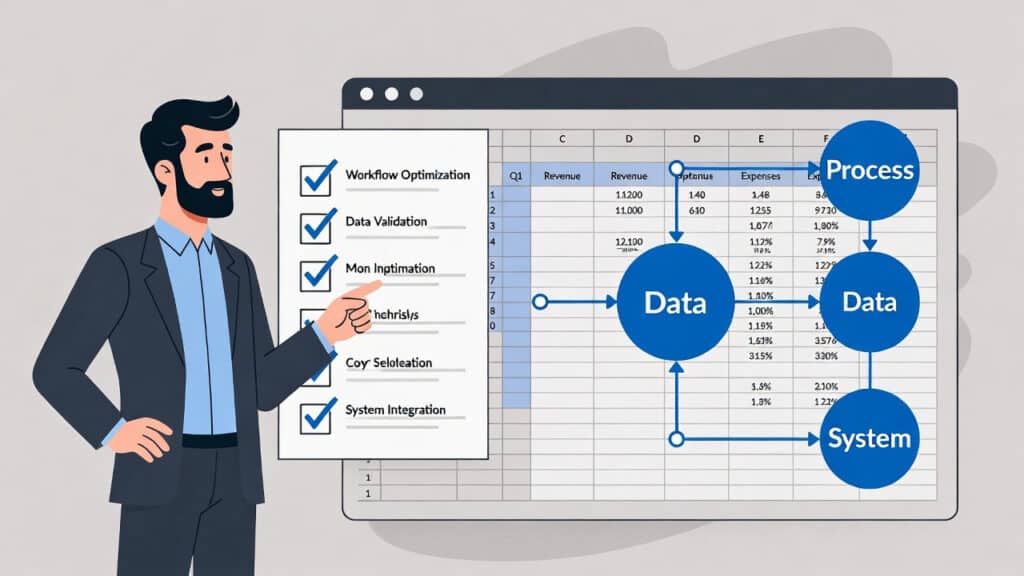Le déploiement des politiques RSE (Responsabilité Sociale et Environnementale) est né d’attentes sociétales fortes, il y a quelques années. La RSE a pour but de contraindre les entreprises à se pencher sérieusement sur les implications sociales, environnementales et économiques de leurs activités. Elles doivent donc mesurer l’impact des actions menées sur ces 3 composantes. Evidemment, les ressources humaines se retrouvent en première ligne. Avec ces nouveaux enjeux, elles observent une production croissante d’informations relatives à toutes sortes de sujets concernés par la RSE : santé-sécurité, gestion des compétences, de l’employabilité, égalité hommes-femmes… Ces informations doivent, bien sûr, être ensuite transformées en indicateurs pour le reporting RSE.
Comment les entreprises et donc les RH gèrent-elles ces tâches ? Pourquoi les usages sont-ils si variés ? Existe-t-il des alternatives aux solutions les plus communément utilisées ?
Comment sont construits les reportings RSE ?
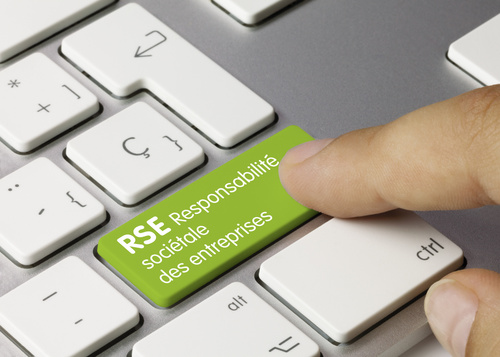 Le département RH est particulièrement touché par les enjeux liés aux politiques RSE. Il doit donc faire face aux problématiques de gestion et de partage des indicateurs obligatoires pour le reporting RSE. D’autant, que les demandes d’acteurs internes ou externes sont de plus en plus nombreuses, les délais de production de plus en plus courts et les contraintes réglementaires de plus en plus astreignantes. Pour répondre à ces exigences, 37%* des entreprises se sont donc équipées de logiciels spécialisés dans le reporting RSE et cette part ne fait que croître.
Le département RH est particulièrement touché par les enjeux liés aux politiques RSE. Il doit donc faire face aux problématiques de gestion et de partage des indicateurs obligatoires pour le reporting RSE. D’autant, que les demandes d’acteurs internes ou externes sont de plus en plus nombreuses, les délais de production de plus en plus courts et les contraintes réglementaires de plus en plus astreignantes. Pour répondre à ces exigences, 37%* des entreprises se sont donc équipées de logiciels spécialisés dans le reporting RSE et cette part ne fait que croître.
Mais alors comment font les 63% restants ? Pour 23%*, ce sont les logiciels de consolidation financière et BI qui sont utilisés. Et pour 23%*, de nouveau, ce sont les outils bureautiques classiques de type Excel ! En effet, les données RSE proviennent majoritairement du terrain, à hauteur de 79%*. La preuve avec le retour d’expérience de Geodis : “Chaque région remontait des données RSE sous Excel avec plusieurs paliers de consolidation et des fichiers volumineux (plus de 140 colonnes) […]”. Cela explique donc, en partie, les raisons qui poussent les entreprises à encore utiliser les outils bureautiques pour réaliser leurs reportings. Cependant, ce n’est pas la seule raison, comme nous allons le voir…
Logiciel RSE : pourquoi ne convient-il pas à toutes les entreprises ?
 Si seulement un peu plus d’une entreprise sur 3 est aujourd’hui équipée de logiciels spécialisés dans le reporting RSE, c’est notamment à cause de la provenance des données, majoritairement terrain. Toutefois, d’autres facteurs peuvent expliquer ce recours aux fichiers Excel et consorts. Parmi eux : le manque de flexibilité et d’automatisation des outils actuels. Cela influe fortement sur la fiabilité du reporting. En effet, les logiciels spécialisés sont souvent développés selon un modèle spécifique et pour tous ceux sortant de ce schéma, les difficultés apparaissent. Des développements spécifiques coûteux deviennent nécessaires, les outils se multiplient, etc. Pour donner un exemple, seuls 7%* des processus de reporting RSE sont entièrement automatisés, les solutions ne couvrant que très rarement le périmètre reporting dans sa globalité.
Si seulement un peu plus d’une entreprise sur 3 est aujourd’hui équipée de logiciels spécialisés dans le reporting RSE, c’est notamment à cause de la provenance des données, majoritairement terrain. Toutefois, d’autres facteurs peuvent expliquer ce recours aux fichiers Excel et consorts. Parmi eux : le manque de flexibilité et d’automatisation des outils actuels. Cela influe fortement sur la fiabilité du reporting. En effet, les logiciels spécialisés sont souvent développés selon un modèle spécifique et pour tous ceux sortant de ce schéma, les difficultés apparaissent. Des développements spécifiques coûteux deviennent nécessaires, les outils se multiplient, etc. Pour donner un exemple, seuls 7%* des processus de reporting RSE sont entièrement automatisés, les solutions ne couvrant que très rarement le périmètre reporting dans sa globalité.
Ensuite, les entreprises se retrouvent souvent face à une problématique de taille : la limitation des possibilités d’analyses. Les logiciels spécialisés ont, pour la plupart, un niveau de granularité des bases de données limité. Les personnes en charge du reporting ne peuvent pas aller aussi loin qu’elles le voudraient dans la construction de leurs indicateurs. On comprend donc mieux pourquoi les outils bureautiques sont encore omniprésents. Toutefois, eux aussi comportent leurs limites.
Quelle alternative pour votre reporting RSE ?
 Même si les outils type tableur sont encore considérablement utilisés pour collecter, consolider et analyser les données RSE, les entreprises ont tout de même bien conscience de leurs limites. La preuve : 56%* d’entre elles souhaitent investir dans un nouvel outil de reporting RSE. Problème : les freins à l’investissement sont bien présents ! Étonnamment, ce n’est pas l’aspect financier qui domine mais bien l’aspect technique. Le fait de devoir identifier le bon outil et les efforts technique liés à son intégration ralentissent sérieusement le processus de décision. Mais alors, n’existe-t-il pas d’autre alternative aux outils de bureautiques ? Heureusement si !
Même si les outils type tableur sont encore considérablement utilisés pour collecter, consolider et analyser les données RSE, les entreprises ont tout de même bien conscience de leurs limites. La preuve : 56%* d’entre elles souhaitent investir dans un nouvel outil de reporting RSE. Problème : les freins à l’investissement sont bien présents ! Étonnamment, ce n’est pas l’aspect financier qui domine mais bien l’aspect technique. Le fait de devoir identifier le bon outil et les efforts technique liés à son intégration ralentissent sérieusement le processus de décision. Mais alors, n’existe-t-il pas d’autre alternative aux outils de bureautiques ? Heureusement si !
Les grands utilisateurs de tableurs pour le reporting RSE le savent : une fois qu’un fichier a été construit, éprouvé et qu’il fonctionne, c’est une mine d’or ! En revanche, la fiabilité des données est difficilement contrôlable (une erreur de copier/coller est si vite arrivée…), la gestion des différentes versions peut être une vraie galère et la sécurité des fichiers type Excel est très souvent remise en cause.
Pour pallier à ces “handicaps”, il existe une alternative très simple à mettre en oeuvre : Gathering Tools. Cette application reprend exactement l’aspect de vos fichiers Excel tout en améliorant les différentes failles. Les données sont désormais hébergées dans le SI de l’entreprise, vous pouvez ajouter des processus de vérification de cohérence, construire des workflows de validation, gérer les versions, etc. Pour le reporting RSE, où près de 80% des données viennent du terrain, c’est un tournant radical et nous ne sommes pas les seuls à l’affirmer : “Une fois le processus porté sous Gathering Tools, la collecte a permis de gagner plus de 3 semaines de délai et le coût projet a ainsi été rentabilisé dès la première campagne. Suite à ce succès les collectes annuelles vont devenir trimestrielles puis, à terme, mensuelles.” (retour d’expérience de Bruno Ducros, Business Intelligence Manager, GEODIS).
